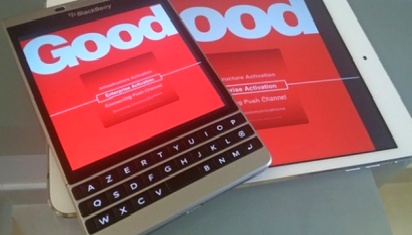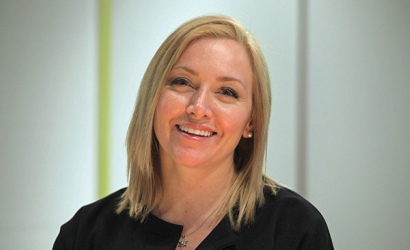Republished with minor edits from the official BlackBerry Blog, Inside BlackBerry.
 Two of the most popular mobile device management companies will become one, as BlackBerry plans to acquire Good Technology. For some, this is a surprise. That’s why Inside BlackBerry sat down with BlackBerry COO Marty Beard and Good CEO Christy Wyatt to discuss why and how the two companies are coming together.
Two of the most popular mobile device management companies will become one, as BlackBerry plans to acquire Good Technology. For some, this is a surprise. That’s why Inside BlackBerry sat down with BlackBerry COO Marty Beard and Good CEO Christy Wyatt to discuss why and how the two companies are coming together.
There’s history here with BlackBerry and Good. Can you give us that background?
MB: Some people may not realize it, but BlackBerry and Good have both been delivering secure mobility for more than a decade. Our industry is very competitive and is constantly evolving, so it’s not surprising that we’ve each taken some aggressive positions over the years.
But when you look more closely, you see that we share a common heritage in security and our strengths complement each other incredibly well. With this deal, we will move forward together with the same mission and commitment that has always driven our companies separately: to provide customers with the best and most secure products, services and support to meet their enterprise mobility needs.
 CW: There is a very long history here. We are in an incredibly competitive market and speak to many of the same customers. What has been clear throughout has been that Good and BlackBerry share similar philosophies: we’re both committed to secure mobility, innovation and ensuring our customers are successful. In fact, while working together on this deal it has been incredible to see the synergies between the teams, as well as the extremely complementary nature of our products. What I am most excited about is that our customers will benefit the most from the powerful combination of Good with BlackBerry.
CW: There is a very long history here. We are in an incredibly competitive market and speak to many of the same customers. What has been clear throughout has been that Good and BlackBerry share similar philosophies: we’re both committed to secure mobility, innovation and ensuring our customers are successful. In fact, while working together on this deal it has been incredible to see the synergies between the teams, as well as the extremely complementary nature of our products. What I am most excited about is that our customers will benefit the most from the powerful combination of Good with BlackBerry.
Explain why BlackBerry plans to acquire Good and why it’s a good fit for both sides.
MB: We are strengthening BlackBerry’s software and cloud portfolio – and with Good, BlackBerry is creating the most comprehensive secure mobility platform in the market. Good has strength in multi-OS management and applications – particularly with iOS as well as Windows and Android, which BlackBerry has been delivering with BES12. Good also has established a strong ecosystem of more than 2,000 independent software vendor and customer-developed applications. And the two companies share an unrelenting commitment to security and privacy on behalf of our customers.
CW: BlackBerry has always had a strong commitment to security that we share. While we have a similar vision, we have invested in different parts of the mobility management stack. Overall, our secure mobility platform and application suite is highly complementary to BlackBerry’s end-to-end solution for mobile device management for BlackBerry 10, iOS and Android including both Samsung KNOX- and Android for Work-enabled devices. We’re also excited about the potential for our technology to help BlackBerry as it moves forward with its Internet of Things (IoT) strategy. When you see the potential for the combined roadmap, it is very exciting. CIOs will need the ability to support multiple mobility strategies with a common framework. I do not see any other provider in this space that will be able to offer what BlackBerry and Good will be able to provide.
MB: Ultimately this is a good fit for customers.
Speaking of customers, how does this impact each of your existing customers and what new areas will come of it?
 MB: Our acquisition of Good will mean the end of compromise for customers. We will be able to provide even stronger cross-platform capabilities – ensuring customers won’t have to make any sacrifices in operating systems, deployment models, or any level of privacy and security in their mobile environments. I truly believe that combined, BlackBerry and Good will raise the bar in the enterprise mobility market, enabling our customers to be more productive and protecting their sensitive data across all of their mobile end points.
MB: Our acquisition of Good will mean the end of compromise for customers. We will be able to provide even stronger cross-platform capabilities – ensuring customers won’t have to make any sacrifices in operating systems, deployment models, or any level of privacy and security in their mobile environments. I truly believe that combined, BlackBerry and Good will raise the bar in the enterprise mobility market, enabling our customers to be more productive and protecting their sensitive data across all of their mobile end points.
CW: Historically, when a customer chooses their enterprise mobility platform, they have been asked to make tough choices: do they want deep management, deep security, a great user experience or enterprise scalability? The truth is that customers should not have to choose. They will need different tools to solve different mobility challenges. With this combination, customers can have the best in security, management, ecosystem and experiences all on a common platform. This will be achieved when you combine our mobile container, productivity suite, service management and SDKs with BlackBerry’s enterprise portfolio and their renowned, trusted global network. Integration of solutions such as BBM, WatchDox by BlackBerry, and Good Work will make end users more productive – and they won’t have to give up the devices or functionality that they’ve grown to love.
BlackBerry and Good are both leaders in Enterprise Mobility Management (EMM). How will you combine to enhance EMM, particularly with security and privacy?
MB: Security and privacy have always been at the forefront of what we do and are part of our DNA – and Good echoes this belief. Our comprehensive secure mobility platform will ensure the highest levels of security and personal privacy, which has been proven and certified by governments around the world.
CW: BlackBerry provides capabilities including secure and encrypted voice, text, messaging, data and enterprise files. Good was just chosen by Gartner as the leading vendor in the 2015 High Security for Mobile Management report for capabilities such as our app-level encryption, advanced data loss prevention and secure communication among applications. When all of this is integrated in a unified EMM platform, customers will be confident that their information is safe and data secure, no matter what device or deployment model they rely on.
MB: BlackBerry’s platform was the first mobility solution to receive the coveted Full Operational Capability (FOC) certification to run on U.S. Department of Defense networks. Good is the only company certified as Common Criteria Evaluation Assurance Level 4 Augmented (EAL4+) for mobile collaboration for both iOS and Android. Clearly, our combined strengths in security will offer great value, especially to our regulated customers, who require the highest levels of security.
Where do you go from here? Beyond EMM, how will this enhance BlackBerry’s Internet of Things strategy?
MB: As Christy mentioned earlier, Good technology will contribute to the growth of our Internet of Things platform to go beyond mobile devices and manage new, connected endpoints. Together, we will be able to quickly scale customers’ mobile environments, transforming traditional MDM deployments to mission-critical mobile hubs that will ultimately manage an IoT world. We will be able to better bridge to IoT for regulated industries as many machines and devices requiring next generation digital displays will leverage mobile devices and tablets. These devices all require EMM solutions.
CW: In addition to smartphones and tablets running iOS, Android, Windows Phone, BlackBerry 10 and BlackBerry OS, Good will enable BlackBerry to add support for wearables. This is something we do today for both Apple Watch and Android Wear. This need to manage and enable secure productivity applications for this new breed of devices is becoming increasingly relevant as watches, fitness trackers and other devices are connecting to corporate networks.
Marty and Christy, thank you for taking the time to speak to us about why BlackBerry plans to acquire Good Technology.
As the transaction is not expected to close until the BlackBerry’s 2016 fiscal third quarter, we’ll be sure to keep readers updated on further details.




